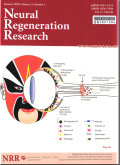Mutations of beta-amyloid precursor protein alter the consequence of Alzheimer's disease pathogenesis
摘要Alzheimer's disease is pathologically defined by accumulation of extracellular amyloid-β (Aβ). Approximately 25 mutations in β-amyloid precursor protein (APP) are pathogenic and cause autosomal dominant Alzheimer's disease. To date, the mechanism underlying the effect of APP mutation on Aβ generation is unclear. Therefore, investigating the mechanism of APP mutation on Alzheimer's disease may help understanding of disease pathogenesis. Thus, APP mutations (A673T, A673V, E682K, E693G, and E693Q) were transiently co-transfected into human embryonic kidney cells. Western blot assay was used to detect expression levels of APP, beta-secretase 1, and presenilin 1 in cells. Enzyme-linked immunosorbent assay was performed to determine Aβ1–40 and Aβ1–42 levels. Liquid chromatography-tandem mass chromatography was used to examine VVIAT, FLF, ITL, VIV, IAT, VIT, TVI, and VVIA peptide levels. Immunofluorescence staining was performed to measure APP and early endosome antigen 1 immunoreactivity. Our results show that the protective A673T mutation de-creases Aβ42/Aβ40 rate by downregulating IAT and upregulating VVIA levels. Pathogenic A673V, E682K, and E693Q mutations promote Aβ42/Aβ40 rate by increasing levels of CTF99, Aβ42, Aβ40, and IAT, and decreasing VVIA levels. Pathogenic E693G mutation shows no significant change in Aβ42/Aβ40 ratio because of inhibition of γ-secretase activity. APP mutations can change location from the cell surface to early endosomes. Our findings confirm that certain APP mutations accelerate Aβ generation by affecting the long Aβ cleavage pathway and increasing Aβ42/40 rate, thereby resulting in Alzheimer's disease.
更多相关知识
- 浏览28
- 被引6
- 下载0


相似文献
- 中文期刊
- 外文期刊
- 学位论文
- 会议论文



 换一批
换一批 换一批
换一批



